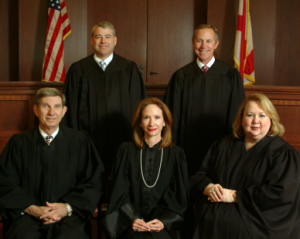 BIRMINGHAM, Ala. — The five churchgoing members of the Alabama Criminal Court of Appeals unanimously struck down the state’s ban on sodomy on Friday, stating that Alabama’s law against sex acts between those of the same gender is unconstitutional.
BIRMINGHAM, Ala. — The five churchgoing members of the Alabama Criminal Court of Appeals unanimously struck down the state’s ban on sodomy on Friday, stating that Alabama’s law against sex acts between those of the same gender is unconstitutional.
Justices Windom, Welch, Kellum, Burke and Joiner overturned Alabama Code 13A-6-65 in making their declaration, which criminalizes those who engage in “deviate sexual intercourse with another person,” and “[c]onsent is no defense to a prosecution.”
The case, Williams v. Alabama, centered on a Dallas County man who sodomized another man after forcing him to drop his pants, and was sentenced to 12 months behind bars for sexual misconduct under the law. The state attorney had brought the case to the appeals court after prosecution had failed to have the man convicted of a felony under the law—first-degree rape-based sodomy—and instead was found guilty of a misdemeanor for engaging in what the court considered consensual “deviate sexual intercourse.” The state asked the appeals court to overturn the ruling and remand the case to convict the man of rape.
In addition to rejecting the state’s request, the court struck down Alabama’s sodomy law altogether, citing the 2003 U.S. Supreme Court ruling in Lawrence v. Texas, which decriminalized sodomy on a federal level. The case had been decided by a Republican majority.
“The Supreme Court concluded that the statute violated the Due Process Clause of the Fourteenth Amendment to the United States Constitution and that it ‘further[ed] legitimate state interest which can justify its intrusion into the personal and private life of the individual,'” the justices wrote. “Because ‘[t]he only federal court whose decisions bind state courts is the United States Supreme Court’ Lawrence controls our decision.”
It reiterated its holding to the Lawrence decision in issuing its final ruling.
“In light of the United States Supreme Court’s holding in Lawrence, we conclude that § 13A-6-65(a)(3) is unconstitutional and that the circuit court erred in denying Williams’s motion for a judgment of acquittal,” the court declared. “Therefore, we reverse the circuit court and render a judgment in favor of [the defendant].”
The justices that issued the ruling are active members of various congregations that likely oppose homosexual behavior. Justice J. Michael Joiner is an elder at The Church at Brookhills in Birmingham and serves as a Bible teacher.
“He is an active member of The Church at Brookhills where he teaches a Bible study class,” his bio reads. “He previously served as Deacon and Chairman of the Shelby Baptist Association Credentials Committee.”
Justice Samuel Henry Welch is cited as “a lifelong member of First Baptist Church of Monroeville, where he has taught Sunday school and served as a counselor at Crosspoint.” Justice Elizabeth Keller attends the First Baptist Church of Montgomery; Justice Lisle Burke attends the First United Methodist Church of Arab, where he serves as the assistant organist, and Presiding Judge Mary Becker Windham is a member of the Church of Christ.
Eric Johnston of the Southeast Law Institute based in Birmingham, AL told Christian News Network that he believes the judges were “backed into a judicial corner” in light of the U.S. Supreme Court ruling in Lawrence v. Texas, and that he would have concurred as it is the “law of the land,” but would have issued a separate opinion to disagree with the findings in Lawrence.
“If I had been one of those judges, that’s what I would have done. That’s the way you make your voice known,” Johnston continued.
Michael Peroutka, who is the founder of Institute on the Constitution, an attorney and was a 2004 presidential candidate, stated that the ruling, being made by those who claim to be representatives of Christ, is a “reflection on the condition of American Christianity.”
“They just said that the Supreme Court is God, and that the Supreme Court is the lawgiver,” he told Christian News Network. “How do they reconcile that with the fact that they call themselves Christians? … Instead of obeying God, it’s playing God.”
“[Sodomy] is an abomination. God condemns it,” Peroutka said. “No man, no human, has the authority to change [His law].”
He explained that unlike the belief of most judges and attorneys today, case law is not lawful if it contradicts the word of God.
“What some court has said is only relevant if it aligns with what God has said,” Peroutka explained. “God is the source of law. … Unless it’s consistent with God’s law, it’s not law at all.”
Peroutka had supported Alabama Chief Justice Roy Moore in 2003 when he refused to obey a federal court order to remove the Ten Commandments from the rotunda of the Alabama Supreme Court, stating that he had a duty to acknowledge God.
Moore, who was subsequently removed from the bench over his acknowledgement of God, was re-elected in November 2012 to his former position as chief justice.
It has not been announced whether prosecution will appeal the decision to the Alabama Supreme Court, and calls have not been returned for comment.
Become a Christian News Network Supporter...


